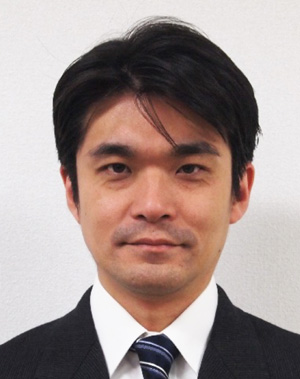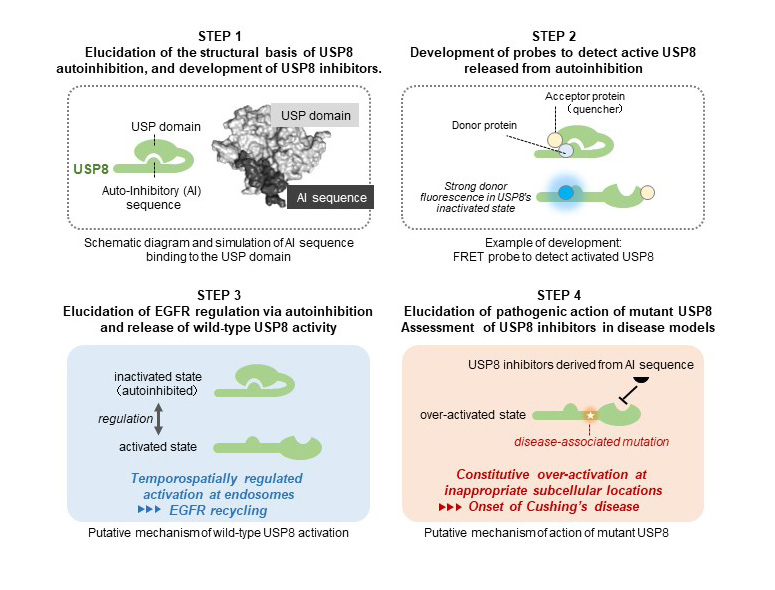Toshiaki Fukushima
Elucidation of mechanisms underlying USP8 autoinhibition and development of USP8 inhibitors for Cushing's disease therapy
 |
Toshiaki Fukushima, PhDTokyo Institute of Technology, Institute of Innovative Research |
|---|
Research summary
Deubiquitinating enzymes are involved in a variety of cellular functions, and have attracted much attention for their association with various diseases. Ubiquitin-specific protease 8 (USP8), a deubiquitinating enzyme, controls cell proliferation; it deubiquitinates growth factor receptors in endosomes and promotes their recycling to the cell membrane, leading to augmentation of growth factor signaling. USP8 is associated with Cushing's disease, an intractable disease caused by hypersecretion of adrenocorticotropic hormone (ACTH) from pituitary corticotrophs. USP8 is frequently mutated in Cushing’s disease corticotrophs, causing USP8 over-activation. It leads to ACTH hypersecretion and disease onset, although detailed molecular mechanisms remain unclear.
We recently identified a unique USP8 autoinhibition mechanism. A short amino acid sequence (the auto-inhibitory (AI) sequence) in the center of the molecule interacts with the catalytic domain (USP domain) to inhibit its activity. Taken together with other results, this mechanism suggests that USP8 is activated only at the endosome by a site-specific mechanism in which autoinhibition is released, thereby deubiquitinating endosomal receptors. We also suggest that, in Cushing's disease, this regulatory mechanism is impaired. Thus USP8 is over-activated throughout the cytoplasm, leading to disease onset.
In this research, we propose to elucidate the structural basis for USP8 autoinhibition. Based on this information, we will develop new molecular probes to detect activated USP8 in which autoinhibition is released. We will also develop candidate USP8 inhibitors (e.g. by modifying peptides derived from the AI sequence). Using these new research tools, we will clarify mechanisms of wild-type and Cushing's disease-associated mutant USP8 action in cells. We will also assess the potential of newly developed USP8 inhibitors for treatment of Cushing's disease.

Publications
- *Beziat V, Rapaport F, Hu J, Titeux M, Bonnet des Claustres M, Bourgey M, Griffin H, Bandet E, Ma CS, Sherkat R, Rokni-Zadeh H, Louis DM, Changi-Ashtiani M, Delmonte OM, Fukushima T, Habib T, Guennoun A, Khan T, Bender N, Rahman M, About F, Yang R, Rao G, Rouzaud C, Li J, Shearer D, Balogh K, Al Ali F, Ata M, Dabiri S, Momenilandi M, Nammour J, Alyanakian MA, Leruez-Ville M, Guenat D, Materna M, Marcot L, Vladikine N, Soret C, Vahidnezhad H, Youssefian L, Saeidian AH, Uitto J, Catherinot E, Navabi SS, Zarhrate M, Woodley DT, Jeljeli M, Abraham T, Belkaya S, Lorenzo L, Rosain J, Bayat M, Lanternier F, Lortholary O, Zakavi F, Gros P, Orth G, Abel L, Pretet JL, Fraitag S, Jouanguy E, Davis MM, Tangye SG, Notarangelo LD, Marr N, Waterboer T, Langlais D, Doorbar J, Hovnanian A, Christensen N, Bossuyt X, Shahrooei M, *Casanova JL.
Humans with inherited T cell CD28 deficiency are susceptible to skin papillomaviruses but are otherwise healthy.
Cell 184, 3812-3828 (2021)
PMID: 34214472 - Kakihara K, Asamizu K, Moritsugu K, Kubo M, Kitaguchi T, Endo A, Kidera A, Ikeguchi M, Kato A, *Komada M, *Fukushima T.
Molecular basis of ubiquitin-specific protease 8 autoinhibition by the WW-like domain.
Commun. Biol. 4, 1272 (2021)
PMID: 34750505
Former Publications
- Fukushima T, Yoshihara H, Furuta H, Hakuno F, Luan J, Duan C, Saeki Y, Tanaka K, Iemura SI, Natsume T, Chida K, Nakatsu Y, Kamata H, Asano T, *Takahashi SI.
Nedd4-induced monoubiquitination of IRS-2 enhances IGF signaling and mitogenic activity.
Nat. Commun. 6, 6780 (2015)
PMID: 25879670 - Furuta H, Yoshihara H, Fukushima T, Yoneyama Y, Ito A, Worrall C, Girnita A, Girnita L, Yoshida M, Asano T, Komada M, Kataoka N, Chida K, Hakuno F, *Takahashi SI.
IRS-2 deubiquitination by USP9X maintains anchorage-independent cell growth via Erk1/2 activation in prostate carcinoma cell line.
Oncotarget. 9, 33871-33883 (2018)
PMID: 30338032 - Xie X, Matsumoto S, Endo A, *Fukushima T, Kawahara H, Saeki Y, *Komada M.
Deubiquitylases USP5 and USP13 are recruited to and regulate heat-induced stress granules through their deubiquitylating activities.
J. Cell Sci. 131, jcs210856 (2018)
PMID: 29567855 - Kawaguchi K, Endo A, *Fukushima T, Madoka Y, Tanaka T, *Komada M.
Ubiquitin-specific protease 8 deubiquitinates Sec31A and decreases large COPII carriers and collagen IV secretion.
Biochem. Biophys. Res. Commun. 499, 635-641 (2018)
PMID: 29604273 - Naito S, *Fukushima T, Endo A, Denda K, *Komada M.
Nik-related kinase is targeted for proteasomal degradation by the chaperone-dependent ubiquitin ligase CHIP.
FEBS Lett. 594, 1778-1786 (2020)
PMID: 32162334





